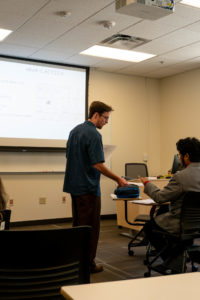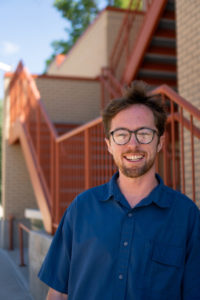
Understanding the relationship between mind and body is imperative in life. The discernment of what practices work best for an individual, especially at an early age, can work as a guiding compass for years to come. Ryan Burns, studying for his master’s degree in Occupational Therapy at Colorado State University, works to implement this into daily practice.
Burns appreciates the holistic approach of OT, striving to assimilate the use of mindfulness, music, movement, and sensory integration into his work. This summer, Burns has an internship at the Center for Community Partnerships. Most of his work is with the Thrive program which is focused on helping neurodiverse young adults find meaningful employment.
The Thrive participants, aged 15-21, explore career options and practice skills for employment in a four-week, classroom-based setting, and optional internships. In partnership with the Division of Vocational Rehabilitation, Thrive boosts participant’s resumes, skills, and confidence in securing and maintaining employment. Burns is applying the OT approach of finding proactive, practical adaptations and skills for each individual in the classes, guiding them to identify and build on their abilities and strengths and align them with industries and jobs that are a good fit.
Burns has uncovered a distinct fondness for helping people, using OT to enhance the lives of others and construct meaningful learning environments. His work at CCP will create a lasting foundation for the participants while forging alliances and expanding awareness and inclusion efforts with their employers.
Teaching the individual rather than the class
Burns’ devotion to occupational therapy began during his time at Naropa University in Boulder, Colo, where he studied psychology and music with the ambition to be a music therapist. During his time at Naropa, he worked off-campus at a preschool which sparked his desire to work with children.
Burns was then introduced to the concept of “this magical thing called OT,” as Burns calls it. “I would be able to combine so much of what I learned as an undergraduate about mindfulness, movement, music, and even Jungian psychology with my experience working with children in play-based preschools.”

This introduction prompted further actions from Burns, as he began striving for more attainable and effective practices – and drove him to CSU’s highly regarded OT program. He now uses the concept of OT in his everyday practices.
“I am trying to be as holistic, and client-centered as possible while in the classroom,” Burns said.
The root of this practice is predicated on finding the best approach for each individual. This ideology is visible in his time with CCP this summer.
“During the first half of the summer, I have been teaching a class about how to identify a job that is meaningful, how to apply, write a resume, interview, and be successful upon attaining the job. My favorite part of the class was incorporating ‘soft skills’ into each lesson,” Burns said. “They include communication, teamwork, professionalism, enthusiasm, and workplace ethics.”
While many of these facets of education may seem generalized, they are seldom focused on in general job training programs. For the neurodivergent Thrive participants, interpersonal relations can be more challenging than the tasks of a job. Soft skills are important in interviews, securing a job, and establishing and maintaining positive connections with supervisors and colleagues. When they don’t come naturally to someone on the autism spectrum, for example, it can be difficult to find or keep a job, let alone advance in a career.
Burns works to teach these skills with the intention of application in the future. His work with CCP is dissimilar from many educators in that Thrive participants learn about and practice the subtle yet influential functions of everyday life so that his students are readily equipped for success.
Thriving in work
Burns embraces the work and is continually striving to be better and more effective than the day before.
Through his OT master’s program at CSU, Burns has dedicated his time to becoming a catalyst for improvement. He translates the skills obtained in class and uses them in his work with CCP to ensure that everyone he works with is equipped with the proper tools to flourish.

“My unique constellation of strengths and interests make me a good fit for helping people,” Burns said. He has found that he has the strengths to help others, and further that the overarching practices of OT can have a resounding impact on the population.
“OT has so much potential to help people outside of the traditional medical settings,” Burns said. He continually reinforces the positive impact that these practices have on the population and that alternative approaches to traditional systems like education and medicine, such as soft-skill training, should be directed by the individual’s needs and desires rather than a system or cultural expectations.
Burns is a beaming example of the impact that dedication and innate contrition toward others can have on a community. He works to perfect his craft and mold his teaching, allowing for the strengths of an individual to dictate their path. This effort has resulted in changed lives and clarity in the future, further creating a generation that does not work to live but one that lives to work.
The Center for Community Partnerships is in the Department of Occupational Therapy , part of CSU’s College of Health and Human Sciences.